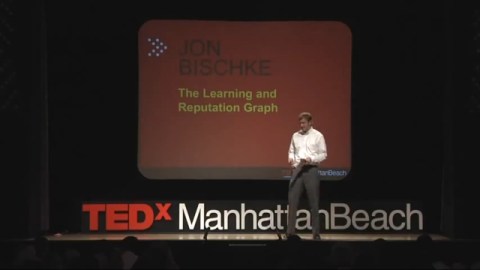The Rise of Adaptive Learning

In today’s article I would like to share a video of my old friend Jon Bischke who recently gave a talk on TEDxManhattanBeach about his thoughts on combining the Learning Graph with the Reputation Graph. Jon is a serial entrepreneur in education and was in the founding teams of five companies including LearnOutLoud, eduFire and his latest venture RG Labs.
The Reputation Graph is about information people have about other people they know and working with. Today, this information is usually not accessible to others as it only exists in our minds. But what we know and think of other people is very interesting for people who need to take decisions on who to hire, for example. The idea of a cultural fit to one’s company is getting a very important factor in the decision making process and the rise of people ranks like Klout also plays into this field. Jon’s new startup Reputation Graph Labs is currently working on tools that will provide people involved in the hiring process with the needed information.
In his TED talk, Jon gives a great overview about two potentially disruptive technologies in education. One is the Learning Graph (which I also call Knowledge Graph), a track record of everything a person learns in one’s entire life. This includes classic knowledge taught in schools, colleges and universities but also informal learning that can take place basically anywhere and anytime.
As Jon points out, with the Learning / Knowledge Graph it is not important when you learn something in your career. Lesson plans and curricula are only important when you want to mark points on a list in order to say: this student has passed 3rd grade because he learned everything on the list. With the Learning Graph, this process is fluid, you learn things when you need them to learn.
Thanks to technology this process has become far easier to track and companies that work on such adaptive learning technologies are currently receiving a lot of attention both from educators and investors. Grockit just raised $7 million, Knewton raised $33 million and partnered with Pearson to power its digital curricula and last but not least Khan Academy received another $5 million grant from the O’Sullivan Foundation. All three are based on the idea of self-paced learning with the support of an intelligent software that learns from the student’s behavior in order to deliver an individualized curriculum for every learner.
Another important factor in fostering adaptive learning is, of course, the need to close the digital divide in order to give every student access to the Internet. Cable companies in the US just announced a new initiative called Connect-to-Compete that will offer Internet service for $9.95 per month to homes with children that are eligible for free school lunches. It also includes Microsoft Corp., which pledges to sell PCs with its Office software suite for $250 and a firm called Redemtech offering to sell refurbished computers for $150 which includes shipping.





